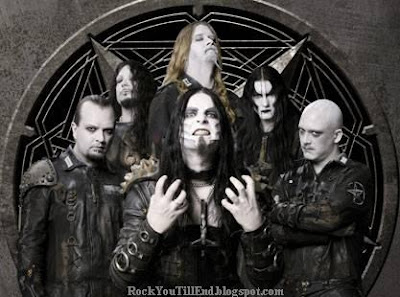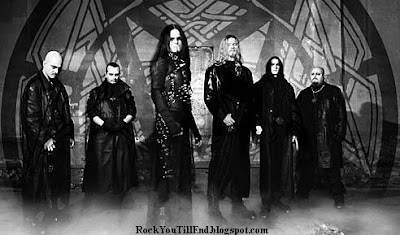Amid the fiery chaos of the early ‘90s Norwegian black metal scene arose a maelstrom of raw violence named Dimmu Borgir. Founding members Shagrath (vocals/drums), Silenoz (guitar), and Tjodalv (guitar) sought to blaze their own dark path through the hostile underworld of the burgeoning scene by combining the bleakness of ‘80s black metal and a few classical touches with more traditional heavy metal riffing. The band solidified in 1993 after being joined by Brynjard Tristan on bass and Stian Aarstad on keyboards. The fearsome five-piece recorded a 7" EP called Inn I Evighetens Morke ("Into the Eternity of Darkness") for Necromantic Gallery Productions in 1994. While the EP sold out in just a few weeks, Dimmu Borgir failed to receive the attention they deserved.

Dimmu Borgir
All that changed in late '94 when the band released their hellacious full-length debut For All Tid on No Colours Records (re-released by Nuclear Blast in 1998). Featuring contributions from Aldrain of Dødheimsgard and Vicotnik from Ved Buens Ende, For All Tid was a slow, dark, atmospheric album that immediately established Dimmu Borgir as one of the most promising bands in the Norwegian scene. In 1996 the band only reinforced that fact by releasing Stormblåst on Cacaphonous Records. The album showed an increase in speed while still maintaining the melody and atmosphere that characterized For All Tid. The band made a line-up move with Tjodalv taking over drums and Shagrath doubling up on guitar and vocals instead. Dimmu Borgir closed out 1996 with the Devil's Path MCD and another line-up change. Nagash (Troll, Covenant) joined on bass, replacing the departed Tristan. Released on Hot Records, where Shagrath worked at the time, Devil's Path featured the incredible title track, two versions of Celtic Frost's "Nocturnal Fear," as well as an early version of the now classic song "Master of Disharmony."
After establishing themselves in the top-tier of the Norwegian black metal scene, Dimmu Borgir set their misanthropic minds on conquering the rest of the world. With one fell swoop of their blackened magic Dimmu Borgir unleashed an album of such immense proportions that all in its path were simply consumed by the ensuing darkness. Enthrone Darkness Triumphant (1997) was an unparalleled international breakthrough, selling in excess of 150,000 copies. This landmark release not only marked their first release for Nuclear Blast but also became their first English language album. Produced by Peter Tägtgren (Immortal, Marduk, Destruction) at his nefarious Abyss Studios, Enthrone Darkness Triumphant explored new areas of classically induced melodious aggression. Tägtgren's production provided a powerful, clean sound that had been sorely absent from the black metal scene. The combination of excellent production and memorable songwriting made Enthrone Darkness Triumphant a benchmark black metal release.
To initiate new members into the brood of Borgir, the band released Godless Savage Garden in 1998. While the MCD served as the recording debut of new members Mustis (replacing the fired Aarstad) and the Covenant's Astennu (hired to relieve Shagrath on guitar so he could concentrate solely on vocals), it also acted as a "stop-gap" between releases, keeping the band's name in the press and fresh in fans' minds. It worked, passing all expectations and being nominated for a Spellemannsprisen – a Norwegian Grammy – in the metal category. Unfortunately, the band lost to the Covenant for their Nexus Polaris album.

Dimmu Borgir
Undeterred, Dimmu Borgir unleashed Spiritual Black Dimensions on March 1, 1999. The album took fans and press alike by storm, proving that Dimmu Borgir are the true kings of the blackened throne. Tägtgren once again helped the band deliver a complexly layered and powerfully enchanting album. The band also expanded their boundaries by enlisting the help of Borknagar vocalist/bassist Simen Hestnæs' (a.k.a. Vortex) ethereal vocals. Soon after the recording, Nagash left the fold to pursue the Covenant (now called The Kovenant) full-time. Vortex easily stepped in to fill the vacated bass slot. More trouble arose when Tjodalv (now with Susperia) couldn't commit to the extensive world touring, but things soon fell into place when Nick Barker (ex-Cradle of Filth) signed on.
Now, after two years of studio silence, Dimmu Borgir have returned with their coup de grace, Puritanical Euphoric Misanthropia. After already leaving an indelible mark upon the black metal world, the Black Hearted Angels have now turned to expanding their dark art by stretching their leathery wings a bit. The "Fear and Wonder" lulls the listener in with its soundtrack-like eloquence, but all thoughts of a serene album are shattered when "Blessings Upon the Throne of Tyranny" rages out of the speakers like an unleashed beast. "Kings of the Carnival Creation" and "Hybrid Stigmata" show a nice tempo variance from the blasting opener, but it's "Puritania" that truly shows the diversity Dimmu Borgir achieves on Puritanical Euphoric Misanthropia. The electronic-tinged vocals and pseudo industrial feel make the song unlike anything they have done before. It's these efforts to remain true to their past while exploring new avenues of sound and artistry that set this album apart.

Metal Band Dimmu borgir
Seeking a new outlet for their creative output, the band decided to leave the comfortable bowels of Abyss Studios, opting instead to enter the icy lair known as Studio Fredman in Gothenburg, Sweden. Producer Fredrik Nordström's (In Flames, Arch Enemy, Dark Tranquillity) technical approach replaces the thick, reverb heavy sound of the band's past two efforts with a refined, slick sharpness that cuts to the bone, transforming Dimmu Borgir from a lumbering behemoth into a stealthy assassin. And like all good assassins, Dimmu Borgir have many weapons at their disposal. Vortex (now a permanent member after leaving Borknagar) again weaves his operatic vocals around Shagrath's aggressive growl, giving the songs added depth and texture, while new guitarist Galder (Old Man's Child mastermind – who replaces the "released" Astennu) brings a veteran attitude and welcome experience with arrangements. They even add a "seventh" member in the form of the Gothenburg Opera Orchestra on a few tracks. The Dimmu Borgir that greets 2001 undoubtedly sports the most superior lineup of the band's history, helping lift Puritanical Euphoric Misanthropia beyond anything else in the field of extreme metal.



No comments:
Post a Comment